
The defeat in the Crimean War was a hard blow for the Russian Empire, which, at the end of the conflict, remained the only absolutist state in Europe. His prerogatives in protecting the Christians of the Ottoman Empire had been subverted by Napoleon III, and the impositions of the victorious allies had reduced his influence in the Black Sea, where he could not arm a war fleet. The international isolation of the empire had become apparent, as had the urgent need to modernize its army. Liev Tolstoy , then a young artillery officer stationed in Sevastopol, would not hesitate to write, after the end of the war, that "we have no army, we have a horde of slaves cowering from discipline, who receive orders from thieves and slave traders".
The humiliation caused by the outcome of the Crimean War led to the new tsar, Alexander II , to launch a vigorous program of reforms that echoed the underlying malaise with the old Russian regime. “It is better to abolish serfdom from above than to wait for the moment when it begins to abolish itself, from below”, he would announce to a group of aristocrats. On the military level, it was General Dimitri Milyutin, Minister of War from 1861 to 1881, who led the reform. A veteran of the Crimea and the Caucasus, this officer advocated a scientific approach to war based on extensive statistical studies. With the unconditional support of the tsar, Miliutin reorganized the officer corps, the General Staff and the ministry, at the same time that he promoted military newspapers with which to improve the training of the troops, formed largely, until then, by illiterate conscripts. The culmination of the conquest of the Caucasus, as well as the campaigns in Central Asia against the khanates of Kokanda, Bukhara and Khiva, which revived the Anglo-Russian rivalry - the famous "Great Game" -, were the testing ground of the renewed Russian army .
In parallel with the modernization of the army, Alexander Gorchakov, Minister of Foreign Affairs between 1856 and 1882, he restored the Russian position on the international chessboard. The Second Italian War of Independence, the Second War of the Duchies, the Six Weeks War and, above all, the Franco-Prussian War, had completely altered the situation. Germany, with which Russia maintained good relations, was the new hegemonic power in Central Europe, which allowed Alexander II to tackle the “great crisis in the East” with guarantees. which was triggered in 1875 when major insurrections broke out against the Ottoman administration in Bulgaria and Herzegovina, followed a few months later by rebellions in the autonomous principalities of Serbia and Montenegro.
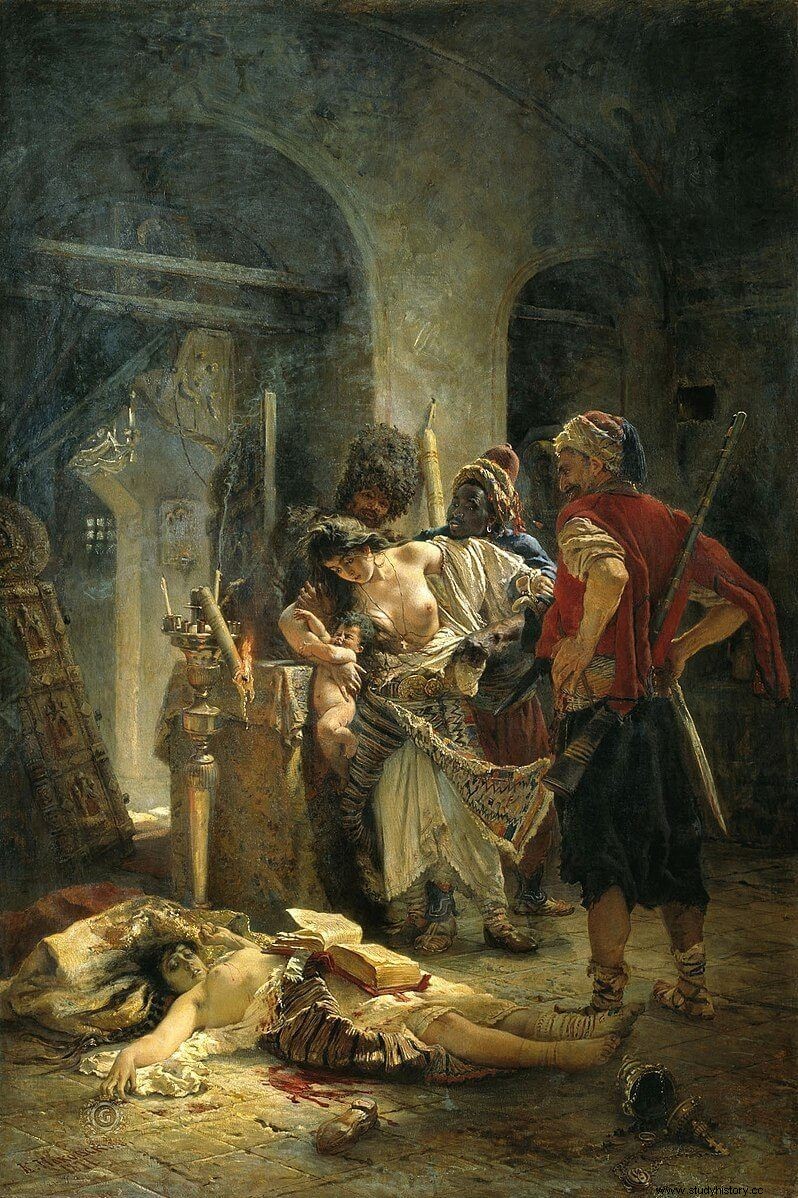
The Ottoman Empire , despite his victory in the Crimea, was in the 1870s deep in debt as a result of loans he had arranged with Western banks and investors to modernize his communications infrastructure and expand and modernize his navy. At the same time, Slavic nationalism in the Balkans increasingly undermined Istanbul's influence over the Empire's Christian subjects. The eastern response to the insurrections was forceful; so much so that the western press spread the stories of the massacres committed by the Ottoman forces or the numerous irregular bashi-bozuk who wandered around them. “It was a mountain of skulls, intermingled with bones from all parts of the human body, nearly entire and rotting skeletons, clothing, human hair, and rotting meat lying in a filthy heap around which grass grew luxuriantly,” the correspondent wrote. Daily News , J. A. MacGahan, on the scene of one of those massacres.
The Russo-Turkish War of 1877-1878
With international public opinion in favor of intervention, its alliance with Germany, and an armed force much better prepared than in 1853, the Russian Empire was ready to go to war with the Ottoman. He did so on April 24, 1877.
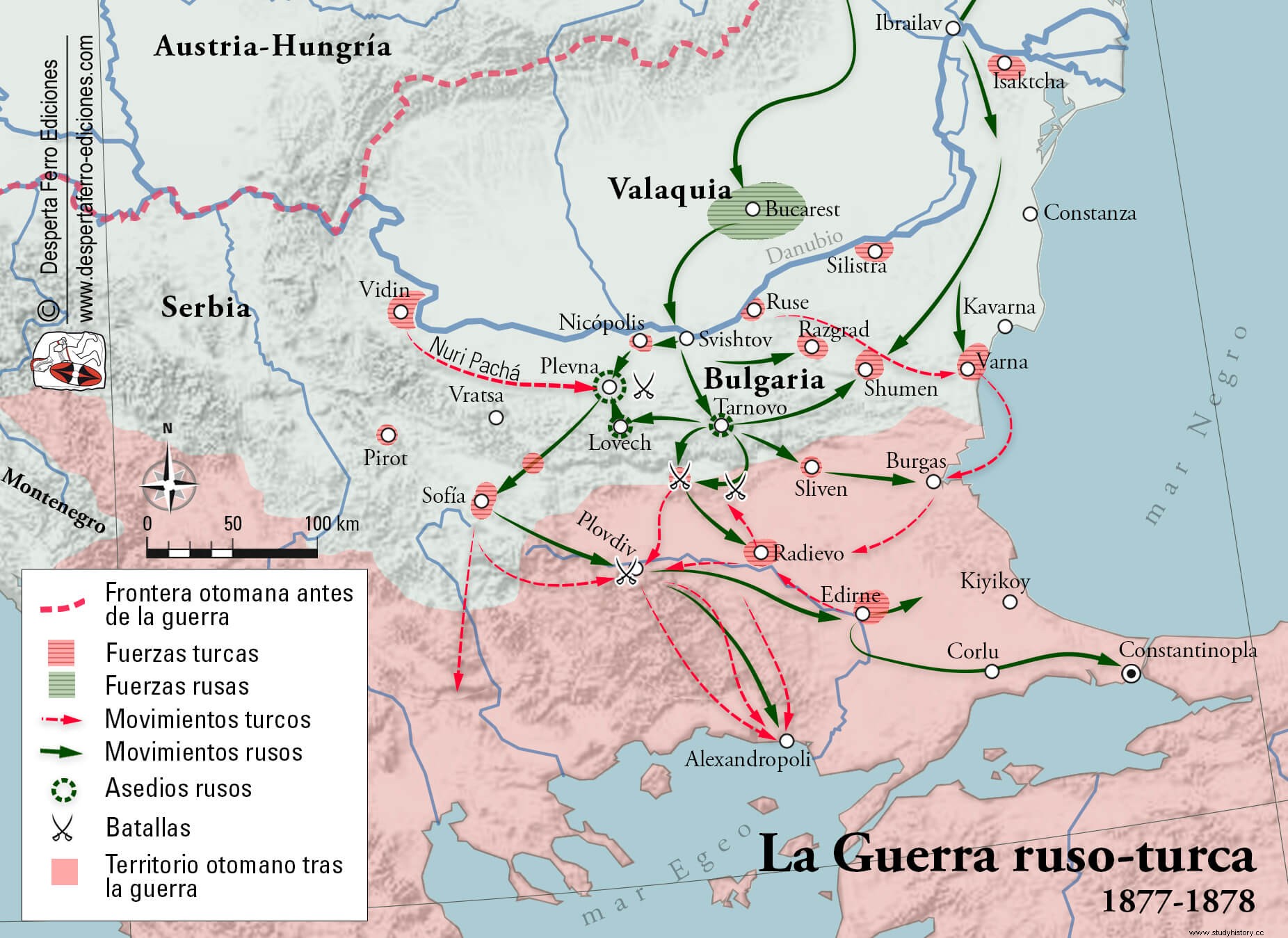
The Army of the South, made up of four corps of army (VIII, IX, XI and XII), plus two rifle brigades, a Cossack division and fifty-four independent Don Cossack squadrons, penetrated into Romania. There, the Russians were received as liberators and, immediately, the Romanian principality, vassal until then of Istanbul, declared itself in rebellion. On May 6, the IV, XIII and XIV Corps arrived by train, bringing the Russian strength to 300,000 men. One of the most prominent officers in the army was Mikhail Skobelev , an old acquaintance of the MacGahan correspondent, with whom he had met in Central Asia. "The last time I saw him, we were both standing on the banks of the Oxus, in the Khanate of Khiva," the American journalist wrote after meeting him again in Bulgaria.
The Ottoman Rumelian Army It had about 160,000 troops spread over the Danube fortresses:Vidin, Ruse, Silistra, Shumen and Varna. The individual quality of the Turkish soldiers was beyond question, but the army had significant organizational, logistical, and command deficiencies. By 1877, only 1,600 of the 20,000 officers in the Ottoman Army had been trained at the Istanbul Military Academy or the School of Military Engineers. The Turkish armament, on the other hand, was not inferior to the Russian, since three quarters of the infantry were equipped with Peabody-Martini breech-loading rifles – American copies of the British Martini-Henry – and the rest, with less powerful Snider rifles. , but also backloading.
One of the assets of the Ottoman forces was their foreign officers, especially British, who helped improve the organization and tactics of the sultan's soldiers. One of them was Valentine Baker Or Baker Pasha, a Crimean veteran who had tried unsuccessfully to get ahead of Skobelev in Khiva, and who, accused of sexually assaulting a woman on a train, had ended up in the service of the khedive of Egypt. When the Egyptian troops arrived at the theater of war, a French journalist would write:“They were excellent men, agile, of active aspect, extraordinarily well dressed and trained; in fact far superior to the Turks on both counts, and they were in stark contrast to the ragged battalions that had fought so well a few days earlier.”
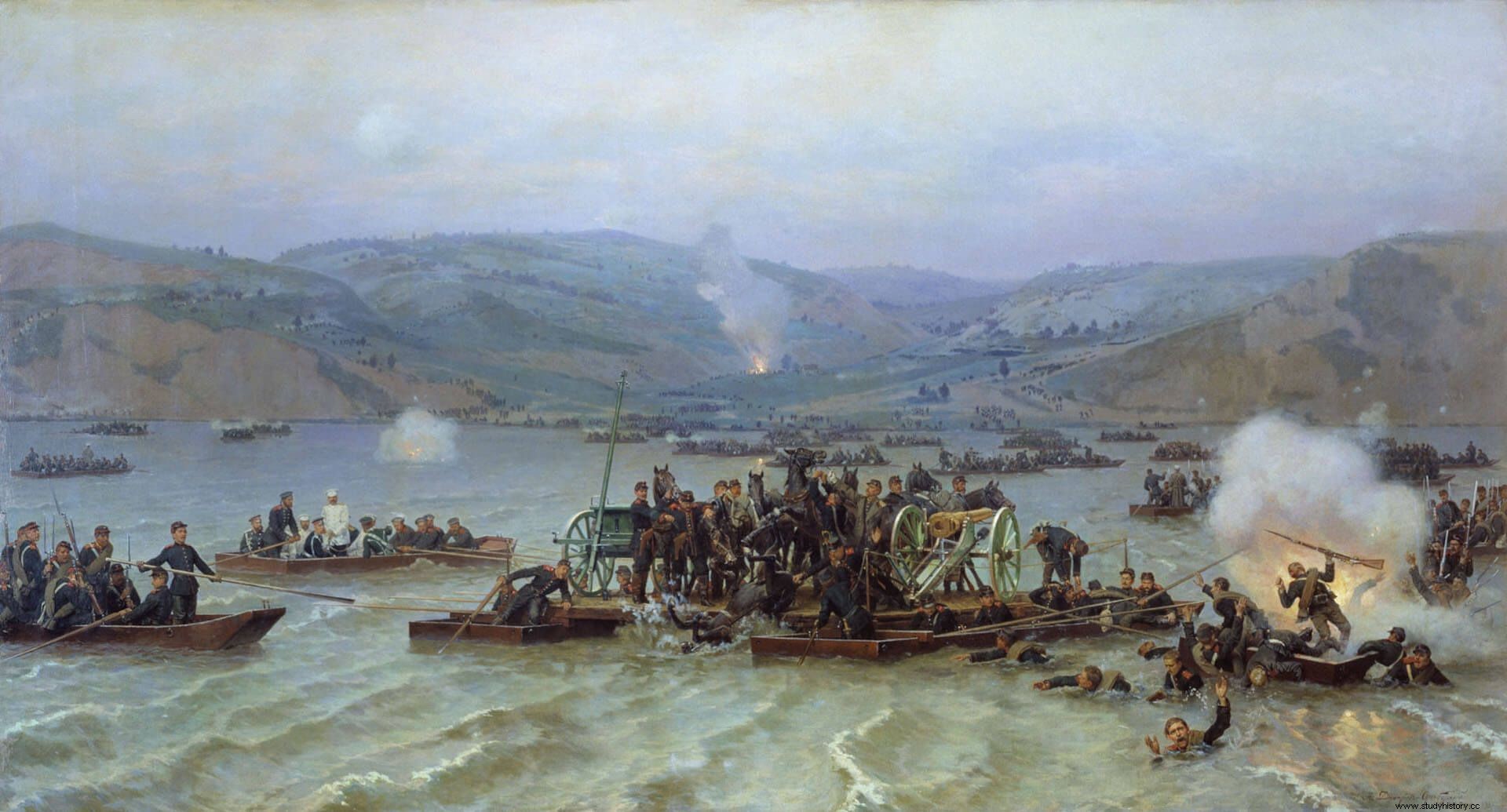
The strategic errors of the Ottoman command, which was convinced that the Russian Army would cross the Danube near Ruse, they allowed the Russian vanguard to cross the Danube without much difficulty further west, at Svishtov, where there was barely a Turkish brigade. With the bridgehead secured, at the end of June, the Russian forces were divided into three detachments:the eastern one, led by Tsarevich Alexander Alexandrovich – the future Alexander III – advanced towards Ruse; the western one, under the command of Baron Nicolai von Krüdener, marched in the direction of Nicopolis, and the Advanced Detachment of General Iósif Vladimirovich Gurko penetrated in the direction of the Balkan foothills, to the south. Since Ruse's flank was well defended and fortified, Istanbul ordered General Osman Nuri Pasha to march hurriedly from Vidin to Nicopolis to check the Russian advance to the west. Nicopolis surrendered on July 16 after a massive Russian assault, but Nuri Pasha arrived in time to organize a new defensive line at Plevna, a small town of 17,000 that would become a myth to the Ottomans.
The Siege of Plevna
On July 19, as Turkish soldiers hastily fortified a series of hills northeast of Plevna, the vanguard of Baron von Krüdener's detachment, the 5th Division of the IX Corps, under the command of General Schilder-Schuldner – about 9,000 men – launched an assault on the Ottoman positions that resulted in 2,823 dead and wounded. In the days that followed, the Turks dug busily under the direction of Osman Pasha, and by the time Krüdener's detachment was complete, a chain of redoubts connected the hills overlooking Plevna.
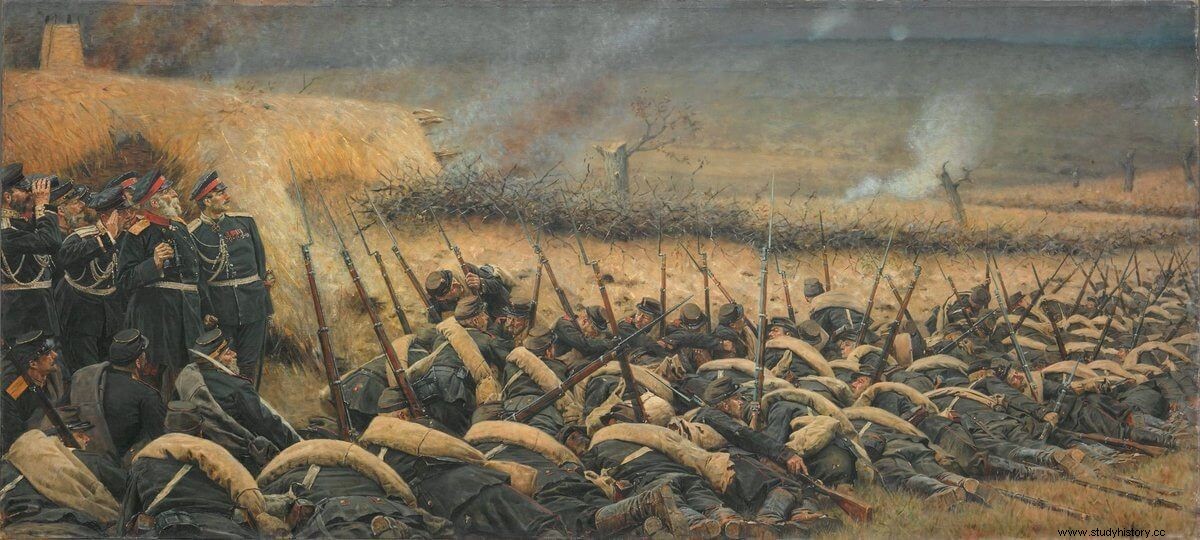
30,000 troops participated in the second Russian assault, of which 169 officers and 7,136 soldiers and non-commissioned officers were killed or wounded, in exchange for some 2,000 Turkish casualties. The successes achieved that day by General Mikhail Skobelev at the Grivitsa redoubt and, on September 3, at Lovcha, whose capture cut off Ottoman supply lines, were not enough to break the defenders.
Russian forces had no choice but to formally besiege Plevna, sparking trench warfare around the town as Gurko's Advanced Detachment, reinforced with Bulgarian militiamen, blocked the Shipka mountain pass, the only route through which the besieged could receive relief. Between those peaks there were four battles that ended in Russian victory. As a result, the Russian high command was able to concentrate more forces around Plevna, and the garrison capitulated on December 10 after a massive assault that finally managed to drive the defenders out of the outer redoubts. The way to the Ottoman capital had been cleared. Despite the harshness of the winter and the great wear and tear suffered during the siege and in the heavy mountain fighting at Shipka, the Russian high command did not stop the offensive. General Gurko wrote, after his men crossed the Maritsa River, that:
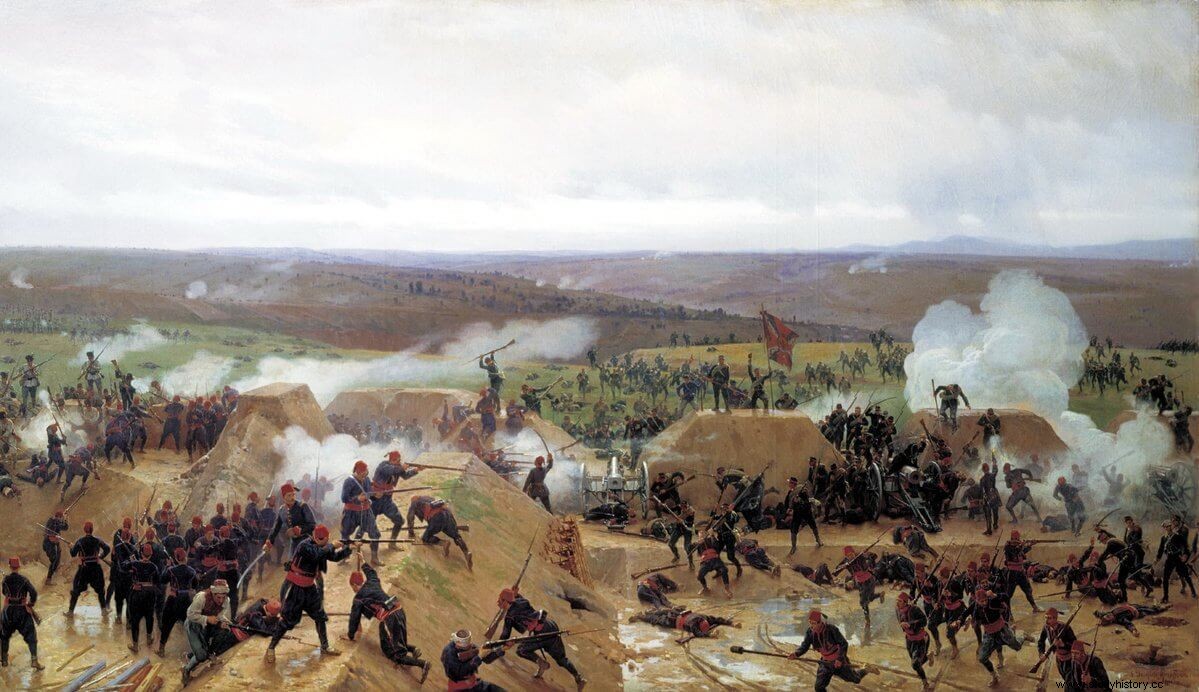
On January 4, 1878, after Skobelev captured at Sheynovo, in the middle of a blizzard, 36,000 soldiers and 90 Ottoman guns, the Russian, Romanian and Bulgarian forces expelled the Turks from Sofia and, on January 16, liberated Plovdiv. From then on, the advance continued without meeting much resistance until, in early March, the Russians and their allies stood before Istanbul, in San Stefano , where a peace was negotiated in which the sultan, abandoned by France and the United Kingdom, would have been forced to give in to all the demands had it not been for the British government of Benjamin Disraeli, alarmed by the collapse of the defenses of the Ottoman Empire, sent a squad to Istanbul to prevent the Russians from occupying the city in what would have meant a mortal blow to the sultan. Disraeli himself wrote in his correspondence that "if the queen [Victoria] were a man, she would like to go and give those Russians, whose word one cannot trust, a tremendous beating." However, British public opinion was against going to war with Russia, so the Ottoman collapse was averted not by military, but by diplomatic means.
Consequences of the Russian-Turkish war of 1877-1878
The Turkish defeat resulted in the independence of Romania, Serbia and Montenegro , in the creation of an autonomous Bulgarian principality within the Ottoman Empire, and in an important Russian territorial advance in the Caucasus, since it had been on this front that the Russian forces had advanced most rapidly and forcefully until they took Erzurum in February 1878.
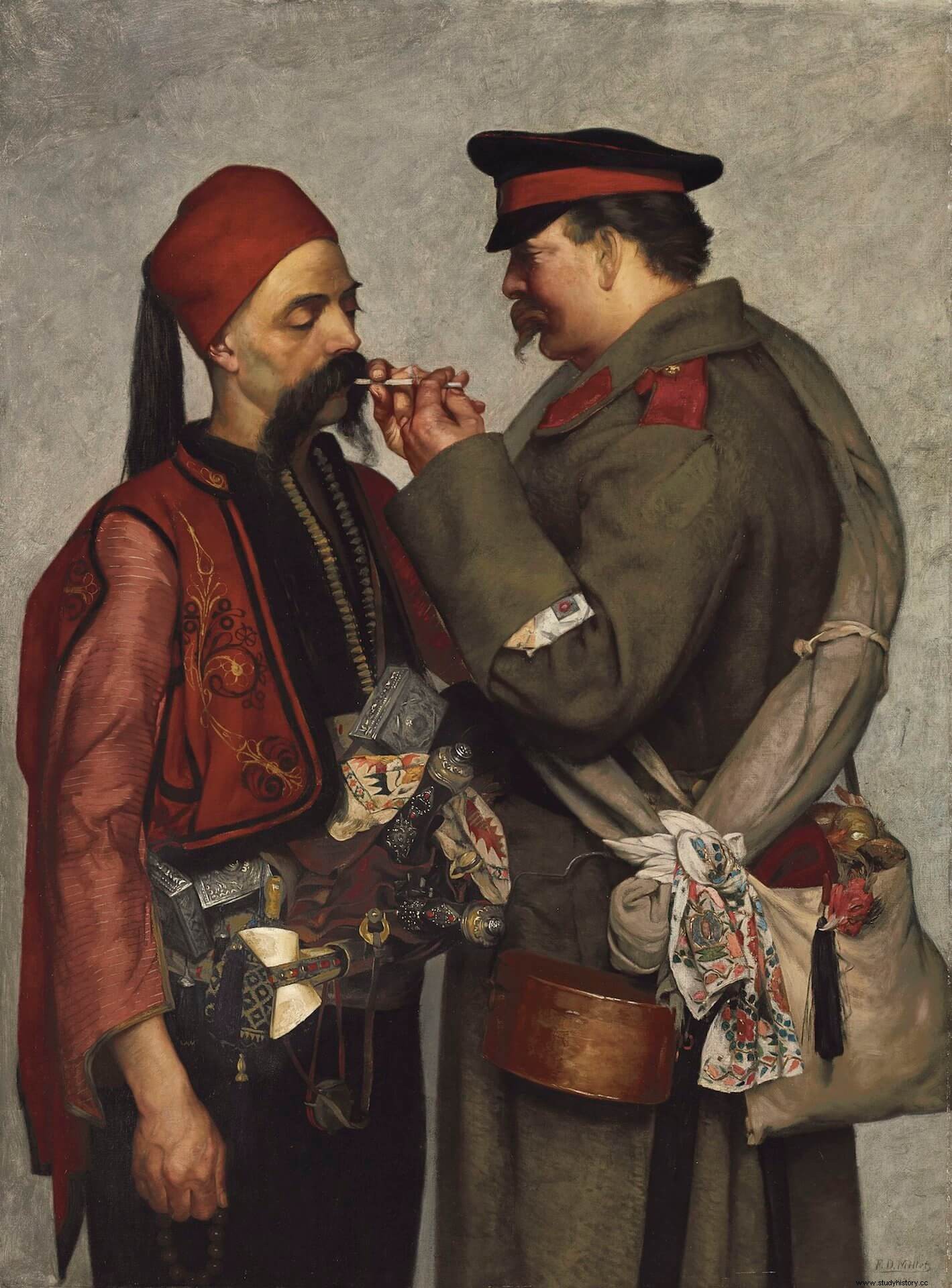
The Congress of Berlin, between June and July, it certified Ottoman isolation, but at the same time it provoked anger on the part of the Pan-Slavists against Bismarck, who sought to limit Russian influence in the Balkans and turned his international policy towards an approximation to Austria-Hungary. The disputes would increase until the outbreak of the First World War, which Mikhail Skobelev, attached to the pan-Slavist theses, already foreshadowed in a speech from 1882 in which he spoke of an inevitable confrontation between "Slavs and Teutons". Russians and Ottomans would face each other again in that conflict with disastrous consequences for their respective rulers.
